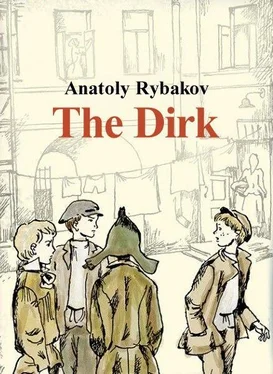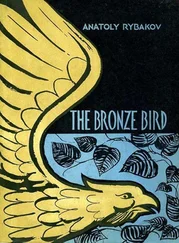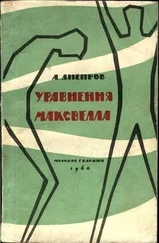Anatoly Rybakov - The Dirk
Здесь есть возможность читать онлайн «Anatoly Rybakov - The Dirk» весь текст электронной книги совершенно бесплатно (целиком полную версию без сокращений). В некоторых случаях можно слушать аудио, скачать через торрент в формате fb2 и присутствует краткое содержание. Город: Moscow, Год выпуска: 1954, Издательство: Foreign Languages Publishing House, Жанр: Детские приключения, Детектив, Исторические приключения, на английском языке. Описание произведения, (предисловие) а так же отзывы посетителей доступны на портале библиотеки ЛибКат.
- Название:The Dirk
- Автор:
- Издательство:Foreign Languages Publishing House
- Жанр:
- Год:1954
- Город:Moscow
- ISBN:нет данных
- Рейтинг книги:4 / 5. Голосов: 1
-
Избранное:Добавить в избранное
- Отзывы:
-
Ваша оценка:
- 80
- 1
- 2
- 3
- 4
- 5
The Dirk: краткое содержание, описание и аннотация
Предлагаем к чтению аннотацию, описание, краткое содержание или предисловие (зависит от того, что написал сам автор книги «The Dirk»). Если вы не нашли необходимую информацию о книге — напишите в комментариях, мы постараемся отыскать её.
The Dirk — читать онлайн бесплатно полную книгу (весь текст) целиком
Ниже представлен текст книги, разбитый по страницам. Система сохранения места последней прочитанной страницы, позволяет с удобством читать онлайн бесплатно книгу «The Dirk», без необходимости каждый раз заново искать на чём Вы остановились. Поставьте закладку, и сможете в любой момент перейти на страницу, на которой закончили чтение.
Интервал:
Закладка:
Polevoy paused.
"I was in hospital for some time after that," he continued, "and before I knew it the Revolution had started, then the Civil War. Then this Nikitsky turned up as the leader of a bandit gang. Well, we met. He evidently heard my name mentioned in Revsk and so nosed me out. He raided the town to settle old scores. Seemingly, he now nee the dirk, too. Only he won't get it: what's useful to the enemy harmful to us. But we'll look into it after the war."
Polevoy paused again.
"Nikitsky's batman was a Revsk man," he said thoughtfully though talking to himself. "Thought I'd find him here... but no... he's disappeared." Polevoy stood up. "I've lost all track of time talking to you! Tell your mother to pack. We'll be leaving in about two days. Well, good-bye!"
He held Misha's small hand in his big fist, winked slyly at him and went away.
Chapter 1O
DEPARTURE
The troop train was already drawn up at the railway station and Misha and Genka had been there several times to look at it.
Red Army soldiers were making plank-beds for themselves in the goods-vans and dividing the carriages into stalls for the horses. The boys spied a-big iron box under the only passenger carriage.
"Look how comfortable this is, Genka," Misha cried, climbing into the box, "you can sleep here and do anything you like. Nothing to be afraid of, is there? You'll only have to spend one night in it and then you can change into the carriage and I'll ride in the box."
"It's all right for you to talk, but how can I leave my little sister behind?" Genka whimpered.
"Fancy that! His little sister! Why she's only three and won't even notice that you've gone. But look what you'll get instead. You'll go to Moscow!" Misha smacked his lips temptingly. "I'll introduce you to the fellows. We've got some great fellows out there! Slava can play anything you care to name on the piano, without even looking at the music. Shura Ogureyev's an actor: you'd never recognize him when he sticks on a beard. Then there's a first-rate cinema in our block; the pictures it shows are all in three parts at least... But if you don't want to go, you don't have to. And you won't see the circus, you won't see anything. Suit yourself."
"All right. I'll go," Genka decided.
"That's a good fellow!" Misha said happily. "You'll write home from Bakhmach and say that you've gone to Moscow to Aunt Agrippina, that everything's all right, and that they're not to worry."
The boys walked down the platform where the troop train was drawn up, "Headquarters" was spelled out in chalk on one of the carriages, which had posters nailed to its sides. Misha undertook to explain the pictures to Genka.
"See that one with the crown, cloak, and red nose? That's the tsar. And the man in the white shirt with a whip in his hand is a Cossack sergeant. That's a Menshevik there, in spectacles and straw hat. And this three-headed snake represents generals Denikin, Kolchak, and Yudenich."
"And who's that?" Genka poked a poster.
The man shown in the poster was a bourgeois in a silk top-hat, with a sagging stomach and a predatory beak-shaped nose. He was sitting on a bag of gold, and blood was dripping from the long nails of his fat fingers.
"Are you blind that you can't see he's a bourgeois?" Misha replied. "He's sitting on money. Thinks he can buy the whole world with it."
"Why's 'Entente' written there?"
"It amounts to the same thing. The Entente's an alliance of all the bourgeoisie of world capital against the Soviet power. See?"
"Uh-huh," Genka drawled rather vaguely. "And why's that got 'International' on it?" he asked, pointing at a big plywood board nailed to one of the carriages.
The picture showed the globe bound with chains which a muscular worker was smashing with a sledge hammer.
"That's the International-the union of all the workers of the world," Misha replied. "The worker there," he pointed at the picture, "is the International. And the chains are the Entente. And when these chains are smashed, the workers will rule the whole world, and there won't be any more bourgeoisie."
... At last the day came when they had to leave. The two horses harnessed to a cart near the house were snorting and brushing the flies away with their tails.
The luggage had been taken to the cart and Mother was saying good-bye to Grandfather and Grandmother. There they were on the porch looking very small and old. Grandfather wore his frayed frock-coat and Grandmother was in her greasy dressing-gown, wiping away tears and creasing her face unhappily. Grandfather was sniffing tobacco and smiling through moist eyes,
"Everything'll be all right. Everything'll be all right," he kept muttering.
Misha climbed on to a suit-case and the cart clattered off over the uneven road, jolting and swaying as it went.
When it turned off the Alekseyevskaya into the Privokzalnaya Misha twisted round for a last look at the little wooden cottage with its green shutters and three willows behind the fence.
Chapter 11
IN THE TROOP TRAIN
Misha pressed his face against the carriage window-pane and peered into the darkness outside, which was sprinkled with bright pin-point stars and the station lights.
The drawn-out whistling and puffing of the engines, the clang of the carriages as they were coupled, and the hurried steps and cries of the guards and oilers, rushing up and down near the train with their lanterns dangling like fire-flies in front of them, disturbed the night and filled it with mysterious and repressing anxiety.
Misha looked steadily out of the window and the longer he kept his face pressed to the pane the more distinct became the objects outside.
The train jerked backwards with a clang of its buffers. Then it moved again, forward this time, and, without stopping, thundered pa the switches as it picked up speed. The station lights were already left behind. The moon had come out from behind the ragged clouds. Trees, cabins and deserted platforms flashed by in a grey ribbon.. Good-bye Revsk!
The train was not moving when Misha woke up early the next morning. He jumped out and ran to the box under the carriage to see how Genka was getting along.
The troop train was standing without its engine on a side-track at some station. Except for a sentry dozing on the platform of one of the carriages, the place was deserted. The horses were stamping their hoofs in their stalls.
Misha scratched the box.
"Genka, come out!" he whispered.
No answer. Misha knocked on the box with his knuckles. Silence. He crawled under the carriage and saw that the box was empty. Where could Genka be? Could he have run back home yesterday?
A bugle sounded the reveille, bringing the troop train and the station to life. Soldiers jumped out of the goods-vans and ran to douse themselves with cold water; the men on duty busied themselves with pots and kettles. The smell of porridge filled the air. One soldier called to a comrade, another swore at someone. Then they all lined up in two ranks facing the train and the roll was called.
The men were shabbily dressed, in a variety of uniforms. They wore peaked helmets, grey infantry caps, cavalry caps, round naval caps, and Cossack fur caps. Some had top-boots, others shoes, felt boots, galoshes, and there were even some who were barefoot. There were soldiers and sailors, workers and peasants. The old and the young, the aged and mere boys were standing side by side.
Misha glanced into the headquarters carriage and saw Genka there. He was standing and wiping tears off his face with his sleeve. A young snub-nosed chap with big ears and a pipe between his teeth was sitting behind the table in front of Genka. His patched tunic was criss-crossed with belts and his extremely wide riding breeches had red piping. Every now and then he took the pipe out of his mouth and spat gloomily over the table past Genka, who started each time as if a bullet were flying at him.
Читать дальшеИнтервал:
Закладка:
Похожие книги на «The Dirk»
Представляем Вашему вниманию похожие книги на «The Dirk» списком для выбора. Мы отобрали схожую по названию и смыслу литературу в надежде предоставить читателям больше вариантов отыскать новые, интересные, ещё непрочитанные произведения.
Обсуждение, отзывы о книге «The Dirk» и просто собственные мнения читателей. Оставьте ваши комментарии, напишите, что Вы думаете о произведении, его смысле или главных героях. Укажите что конкретно понравилось, а что нет, и почему Вы так считаете.












